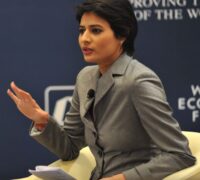
Making the metaverse a safe space for everyone
As organizations begin to incorporate the metaverse into their strategies, CEOs must ensure that the new technology supports equity, inclusion and diversity at every opportunity....
5 October 2023 in The Female Quotient
Despite progress in the fight for gender equality, the gap remains large. This article identifies what can be done. ...

The journey towards gender equality has been a long and enduring one. While organized efforts for women’s rights began in the 19th century, the struggle for equality predates that by centuries. And yet there is still much work to be done.
Let’s look at some eye-opening data.
With progress slowing, the World Economic Forum predicts it will take 131 years to reach gender parity. The Sustainable Development Goals report for 2023 is even bleaker. It predicts that women are currently 140 years away from achieving equal representation of women in positions of power and leadership in the workplace. Moreover, at the current pace, it will take us 286 years to eliminate discriminatory laws against women, 47 years to attain equal representation in parliamentary positions, and a staggering 300 years to end child marriage. These figures are not specific to India; they are universal and reflect the global struggle for gender equality.
So, what can we as a society do to turn aspirations of gender equality into a concrete reality? Empower women to speak up for themselves.
To really make a difference, society needs to tackle gender inequality like the crisis it is, argues Preeti D’mello, Chief Diversity Officer at Tata Consultancy Services (TCS). Being a part of this societal system, whether at home, within our families, or in the workplace, means it’s time for women to step up and play their roles in leveling the playing field by actively working to bring about change, she says.
One of the most significant levers we can use to close the gender gap faster is promoting the education of women. There has been remarkable progress, particularly in India, which has obtained parity in enrollment across all education levels, according to the WEF Gender Gap report 2023. However, it’s not just about education; it’s also about empowering women to speak up for themselves. “This is a powerful lever for change, and a starting point for the broader transformation that’s needed,” says D’mello.
Another driver for gender parity is employment. If nearly 50% of the population are women, this should be reflected in the make-up of a company’s workforce, says Nitu Bhushan, CHRO, Pernod Ricard, South Asia, who oversees the company’s human resources and talent management.
This is not only good for women, but good for business since diverse teams perform better. Organizations need to create genuine change rather than making token gestures, she says.

More women should be elevated into leadership positions, argues Susan Jane Ferguson, Country Representative, UN Women India, who leads and oversees UN Women’s activities and initiatives in India related to gender equality, women’s empowerment, and the promotion of women’s rights.
Women in leadership roles bring increased productivity and emotional intelligence to the workplace. India’s success in local-level women’s representation through quotas stands as a remarkable example.
Empowering women is not just a moral imperative; it’s the key to unlocking a more equitable and sustainable world for all, adds Ferguson.
The idea that “equality begins at home” is a fundamental concept in the quest for gender equality and broader social equity, she explains. It emphasizes that promoting equality, respect, and fairness should start within families and personal relationships. In a household, both partners should share responsibilities, including household chores, childcare, and decision-making. There must be an acknowledgement of the intersection of women’s roles at home and in the workplace. Gender norms often burden women with disproportionate care giving responsibilities, hindering their ability to assume leadership roles. Family-friendly policies and shared parental leave can alleviate these challenges.
Empowering women and closing the gender gap require a shift in perspective and a commitment to understanding and addressing women’s unique needs and aspirations. It’s crucial to recognize that these needs can vary greatly among individuals, says Prachi Rastogi, Diversity and Inclusion Leader APAC, IBM. It’s about respecting individual choices and not imposing benevolent biases. To make this change happen, organizations must take a proactive stance, to promote a diverse and inclusive workplace culture.
Firstly, organizations, both in the private and public sectors, need leaders who champion gender equality and take personal responsibility for driving change. Gender equality should not be delegated solely to HR or diversity and inclusion teams; it’s a leadership imperative, says Rastogi.

Secondly, organizations should actively seek input from their employees, especially women, about their experiences and needs. Policies and programs should be informed by real experiences rather than assumptions.
On a personal level, women should prioritize self-care, recognizing their physical, mental, and spiritual well-being. Self-care is not selfish; it’s a prerequisite for empowerment.
Lastly, society as a whole must play a role in fostering respect, providing opportunities, ensuring security, and promoting education for all women. These foundational pillars are essential for women’s progress and equality, regardless of their circumstances or location.
To conclude, the answer to the question on where women stand with gender equality today is layered and intricate. While undeniable progress has been made, stark disparities endure. Achieving genuine gender equality demands collective efforts from individuals, communities, governments, and organizations. By addressing the challenges that persist and working collaboratively, we can turn the aspiration of gender equality into a concrete reality. This vision isn’t just for the benefit of women; it’s a vision for a more equitable, inclusive and prosperous society for all.
This article is based on a panel discussion, Investing in Women’s Economic Development, one of the Female Quotient’s (FQ) Equality Lounge sessions at the G20 Summit in New Delhi. The Female Quotient joins forces with companies and leaders to curate experiences, thought leadership, and solutions designed to achieve gender equality in the workplace and beyond.

Founder, Gytree and SheThePeople Network

CEO, Association of Business Women in Commerce & Industry (ABWCI)

Founder, Red Dot Foundation Global and Red Dot Foundation

Independent Transformational Coach (Professional & Personal), Leadership, DEI, Culture & Communication

Co-Founder, CashKaro & EarnKaro

Co-Founder & Chief Transformation Officer, Lotus Petal Foundation

Group Service Line Leader, Ipsos UU and Synthesio

3 November 2023 • by Alyson Meister in Diversity, Equity, and Inclusion
As organizations begin to incorporate the metaverse into their strategies, CEOs must ensure that the new technology supports equity, inclusion and diversity at every opportunity....

27 October 2023 • by Ginka Toegel in Diversity, Equity, and Inclusion
It’s time to debunk outdated myths around women lacking confidence and not asking for pay rises and focus on the real problem: societal misperceptions. ...

9 October 2023 • by Natalia Olynec, Lars Häggström in Diversity, Equity, and Inclusion
With a growing number of employees holding their organizations to account over sustainability commitments, the onus is on HR departments to explain a firm’s purpose and impact if they are to attract...

9 October 2023 • by Martina Fuchs in Diversity, Equity, and Inclusion
Executives must do more to change the balance of power in the workplace, says BLM co-founder...
Explore first person business intelligence from top minds curated for a global executive audience